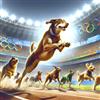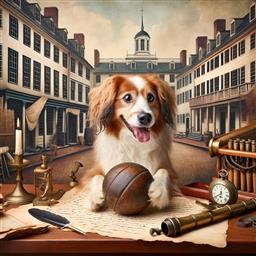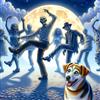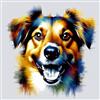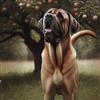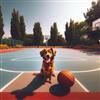1720s Dog Names
Updated: June 27, 2024
Welcome to a unique collection of canine appellations that harks back to a bygone era. This page is dedicated to providing you with a distinctive list of monikers that were popular in the 1720s. We have delved into historical records, literature, and art to bring you names that were once the choice for man's best friend during this rich period in history.
Take a stroll back in time, to an age where dog names reflected the language, culture, and societal values of the period. Often, these names were influenced by popular figures, nature, and even occupations. This compilation is perfect for those who appreciate history and want their canine companion to carry a name that's both unique and backed by centuries of tradition.
Whether you're looking for a name that represents strength, loyalty, beauty, or any other characteristic, these 18th-century dog names offer a treasure trove of options. This is a perfect opportunity for dog owners who wish to give their pets a name with a touch of historical charm and elegance. Let's delve into the world of yesteryears and discover names that have stood the test of time.
| Name | Reason to Choose |
|---|---|
| Abel | Biblical names were in fashion during this period |
| Amos | Common biblical name during this era |
| Aristotle | Named for the ancient Greek philosopher, whose works were widely studied in the 1720s |
| Athens | Represents the Enlightenment's interest in classical civilizations |
| Bach | Johann Sebastian Bach, a composer, was active during this period |
| Barley | Named after a staple food crop of the 1720s, this name would suit a hearty and robust dog |
| Baroque | The Baroque period in Europe ended around the 1720s |
| Baxter | Derives from the trade of being a baker, a common job in the 1720s |
| Beatrix | A reference to popular female names of the time |
| Bodkin | Reflecting a tool used in the 1720s for piercing holes, this name would suit a dog with a sharp or keen sense of smell |
| Breeches | Inspired by the style of trousers worn in the 1720s, this name would fit a dog with a distinguished or elegant appearance |
| Brig | Reflecting the short-term prison on a ship in the 1720s, this name would suit a dog with a strong or imposing presence |
| Brutus | Named after the killer of Caesar, reflecting the interest in Roman history during the 1720s |
| Buccaneer | Reflecting the pirates of the 1720s, this name would suit a dog with a bold or adventurous spirit |
| Caesar | Reflects the interest in Roman history during the Enlightenment |
| Caravaggio | Named after the Italian artist, reflecting the interest in Baroque art during the 1720s |
| Chandler | Reflecting the common occupation of candle-maker in the 1720s, this name would work for a dog who is a source of light in their owner's life |
| Chippendale | Thomas Chippendale, a famous cabinet maker, started his career in the 1720s |
| Cicero | Named after the Roman orator, whose works were studied during the 1720s |
| Cleopatra | Named for the famous queen of Egypt, reflecting the 1720s interest in ancient history |
| Cobb | A nod to the cobblestone roads of the 18th century |
| Corset | Named after the restrictive garment of the 1720s, this would be a fitting name for a dog with a slim or delicate build |
| Crusoe | Robinson Crusoe, a novel by Daniel Defoe, was first published in 1719 |
| Cyrus | A popular male name of the era |
| Dandy | Named after a term used in the 1720s to describe a man who cares a lot about his appearance, this would work for a dog with a clean or meticulous grooming habit |
| Darcy | A popular English name in literature of the period |
| DaVinci | Named after Leonardo da Vinci, reflecting the interest in Renaissance art during the 1720s |
| Defoe | Named after Daniel Defoe, author of Robinson Crusoe |
| Diderot | Denis Diderot, a philosopher, was born in 1713 |
| Dorothea | Reflects the popular female names of the period |
|
Suggest:
|
Submitted!
|
| 1 2 3 4 5 6 | |
Inventions and Innovations Names
| Name | Description |
|---|---|
| Ampere | Inspired by André-Marie Ampère, a physicist and mathematician who contributed to the field of electromagnetism |
| Barometer | Named after the device that measures atmospheric pressure |
| Celsius | A tribute to Anders Celsius, who proposed the Celsius temperature scale |
| Chronometer | Inspired by the maritime chronometer, an invention from the 18th century |
| Compass | Derived from the navigation tool which was crucial for explorations |
| Copernicus | Named after Nicolaus Copernicus, who developed the model of the Solar System that placed the Sun rather than the Earth at the center |
| Descartes | Named after René Descartes, a French philosopher, mathematician, and scientist |
| Fahrenheit | Inspired by Daniel Gabriel Fahrenheit, who proposed the Fahrenheit temperature scale |
| Faraday | Named after Michael Faraday, a scientist who made significant contributions to the study of electromagnetism and electrochemistry |
| Galileo | A tribute to Galileo Galilei, whose work in the field of physics and astronomy revolutionized the scientific world |
| Galvani | Named after Luigi Galvani, who made important discoveries in electricity in the 18th century |
| Gutenberg | Inspired by Johannes Gutenberg, who invented the printing press |
| Halley | Inspired by Edmond Halley, who accurately predicted the return of the comet that bears his name |
| Herschel | Named after William Herschel, who discovered the planet Uranus |
| Kepler | Inspired by Johannes Kepler, a prominent figure in the 17th century scientific revolution |
| Newton | Named after Sir Isaac Newton, one of the most influential scientists of the 18th century |
| Ohm | A tribute to Georg Simon Ohm, who made significant contributions to the understanding of electricity in the 18th century |
| Pascal | A tribute to Blaise Pascal, a French mathematician, physicist, and inventor |
| Pendulum | This name is inspired by the pendulum clock, a popular timekeeping device in the 1720s |
| Sextant | An instrument used for navigation, which was fine-tuned in the 1720s |
| Sonata | This name reflects the musical innovations of the 1720s |
| Steam | A nod to the early days of steam powered machinery |
| Telescope | Named after the instrument that was crucial for astronomical studies in the 18th century |
| Volt | This is a nod to Alessandro Volta, who invented the battery in the 18th century |
| Watt | A tribute to James Watt, who greatly improved the steam engine during the 18th century |
|
Suggest:
|
Submitted!
|
Cultural and Artistic Names
| Name | Description |
|---|---|
| Bach | The name of Johann Sebastian Bach, a distinguished composer of the Baroque era |
| Defoe | Daniel Defoe, an English trader and author of 'Robinson Crusoe', influenced this dog name |
| Diderot | Inspired by Denis Diderot, a French philosopher and writer of the Enlightenment period |
| Gainsborough | Named after Thomas Gainsborough, an English portrait and landscape painter of the 18th century |
| Handel | From George Frideric Handel, a prolific composer of the Baroque era, which extended into the early 1720s |
| Haydn | Inspired by Joseph Haydn, a prominent composer of the 18th century |
| Hogarth | William Hogarth, an English painter and pictorial satirist, rose to prominence in the 1720s |
| Hume | Named after David Hume, a Scottish Enlightenment philosopher, historian, economist, and essayist |
| Leibniz | Gottfried Wilhelm Leibniz, a prominent German polymath and philosopher of the 17th and 18th centuries, inspired this name |
| Locke | John Locke, a leading philosopher and physician in the late 17th century, inspired this dog name |
| Montesquieu | Charles Montesquieu, a French lawyer and philosopher of the Enlightenment era, inspired this name |
| Newton | Isaac Newton's contributions to science in the 17th and 18th centuries were monumental, making his name a suitable choice |
| Pepys | Samuel Pepys, an English Navy administrator and Member of Parliament, was a notable figure of the 17th century |
| Rameau | Jean-Philippe Rameau, a French composer of the late Baroque period, inspired this name |
| Rembrandt | Named after the famous Dutch painter, Rembrandt, who was active during the early 1600s |
| Rococo | A reference to the ornate and theatrical style of art that was popular in the 18th century |
| Rousseau | Jean-Jacques Rousseau, a philosopher and composer of the 18th century, influenced this dog name |
| Rubens | A reference to Peter Paul Rubens, a Flemish artist from the Baroque period |
| Scarlett | A reference to the vivid color often used in Rococo art, popular in the 1720s |
| Spinoza | A nod to Baruch Spinoza, a Dutch philosopher of Sephardi Portuguese origin |
| Swift | A nod to Jonathan Swift, a satirist and author of 'Gulliver's Travels' in the early 1720s |
| Telemann | Georg Philipp Telemann was a self-taught composer and multi-instrumentalist of the early 18th century |
| Vivaldi | From Antonio Vivaldi, an Italian Baroque composer who was well-regarded in the 18th century |
| Voltaire | The French Enlightenment writer, Voltaire, was a prominent figure in the early 18th century |
| Watteau | Jean-Antoine Watteau was a French painter whose work embodied the Rococo style |
|
Suggest:
|
Submitted!
|
Geographical Names
| Name | Description |
|---|---|
| Athens | Named after the Greek capital, a symbol of ancient culture and wisdom |
| Beijing | Named after China's capital, a city with a rich history dating back thousands of years |
| Berlin | The capital of Prussia in the 1720s, a rising European power |
| Boston | Named after a key city in the American colonies during the 1720s |
| Brussels | Belgium's capital, which was a hub of European politics and culture |
| Cairo | Egypt's capital, a city rich in history and a gateway to Africa in the 1720s |
| Delhi | The capital of India, a jewel in the British colonial empire in the 18th century |
| Dublin | Reflects Ireland's capital, a city known for its literary heritage |
| Edinburgh | Scotland's capital, a city steeped in history and tradition |
| Havana | The capital of Cuba, an important node in the Spanish colonial empire |
| Istanbul | The name of Turkey's capital, which was the center of the Ottoman Empire |
| Lisbon | The capital of Portugal, a key player in maritime trade in the 1720s |
| London | The name of the English capital, which was a significant global power during the 18th century |
| Madrid | Derived from the capital of Spain, reflecting the country's Golden Age in the 1720s |
| Moscow | Russia's capital, reflecting the country's growing power in the 1720s |
| Oslo | The capital of Norway, a country known for its maritime tradition |
| Paris | Named after the capital city of France, which was a burgeoning center of culture and art in the 1720s |
| Rome | Echoes the name of Italy's capital, a city rich in history and culture |
| Stockholm | Sweden's capital, a city known for its beauty and charm |
| Sydney | A nod to the Australian city, symbolizing the exploration of new worlds in the 18th century |
| Tokyo | A tribute to Japan's capital, reflecting historical connections between East and West |
| Venice | This city in Italy was a prominent center of trade and commerce in the 1720s |
| Vienna | Reminiscent of Austria's capital, which was a hub of music and art in the 1720s |
| Warsaw | Poland's capital, a city with a storied history and resilience |
| York | Named after the historic city in Northern England |
|
Suggest:
|
Submitted!
|
Literature Inspired Names
| Name | Description |
|---|---|
| Candide | Named after the title character in Voltaire's 'Candide', published in the 18th century |
| Cervantes | An homage to Miguel de Cervantes, whose works were popular in the 18th century |
| Clarissa | A nod to the heroine in Samuel Richardson's 'Clarissa', an influential novel of the 18th century |
| Crusoe | Taken from 'Robinson Crusoe', a novel by Daniel Defoe published in 1719 |
| Dante | A tribute to Dante Alighieri, whose works remained influential in the 18th century |
| Defoe | An homage to Daniel Defoe, writer of 'Robinson Crusoe' |
| Descartes | A tribute to René Descartes, a philosopher and mathematician whose ideas were influential in the 18th century |
| Galilei | A tribute to Galileo Galilei, a scientist whose works were influential in the 18th century |
| Gulliver | Named after the protagonist in Jonathan Swift's 'Gulliver's Travels' (published in 1726) |
| Hobbes | Inspired by Thomas Hobbes, a prominent political philosopher whose works were influential in the 18th century |
| Hume | Named after David Hume, a philosopher, historian, and essayist of the 18th century |
| Kant | Inspired by Immanuel Kant, a prominent philosopher of the 18th century |
| Leibniz | A nod to Gottfried Wilhelm Leibniz, a philosopher and mathematician influential in the 18th century |
| Lemuel | From Lemuel Gulliver, the protagonist in Jonathan Swift's 'Gulliver's Travels' |
| Locke | A nod to John Locke, whose philosophical works were influential in the 18th century |
| Milton | Inspired by John Milton, whose epic poem 'Paradise Lost' was popular in the 18th century |
| Newton | Named after Sir Isaac Newton, a physicist and mathematician whose theories were studied throughout the 18th century |
| Pamela | Inspired by the title character in Samuel Richardson's 'Pamela', published in the 18th century |
| Richardson | Named after Samuel Richardson, a notable 18th century author |
| Rousseau | Named after Jean-Jacques Rousseau, a leading philosopher and writer of the 18th century |
| Spinoza | Named after Baruch Spinoza, a philosopher whose works were studied and debated in the 18th century |
| Sterne | A tribute to Laurence Sterne, an influential author of the 18th century |
| Swift | Inspired by Jonathan Swift, a prominent author of the 1720s |
| Tristram | From Laurence Sterne's 'Tristram Shandy', a landmark novel of the 18th century |
| Voltaire | Inspired by Voltaire, a leading intellectual figure of the 18th century |
|
Suggest:
|
Submitted!
|
Historical Figure Names
| Name | Description |
|---|---|
| Addison | Joseph Addison, an English essayist and poet, was influential during this period |
| Bach | Johann Sebastian Bach, a notable composer, was creating timeless music in this era |
| Berkeley | George Berkeley, an influential Irish philosopher, was active during the 1720s |
| Casanova | Giacomo Casanova, a famous adventurer and writer, was born in the 1720s |
| Defoe | Daniel Defoe, author of Robinson Crusoe, was a notable figure in literature during this era |
| Descartes | René Descartes, a French philosopher, had a lasting influence that stretched into the 1720s |
| Diderot | Denis Diderot, a French philosopher and writer, began his influential work around this time |
| Gay | John Gay, an English playwright and poet, was active in the 1720s |
| Handel | George Frideric Handel, a renowned composer, was at the height of his career in the 1720s |
| Hobbes | Thomas Hobbes, an English philosopher, was a key figure in shaping 18th-century thought |
| Hogarth | William Hogarth, an English painter, was gaining recognition during this period |
| Hume | David Hume, a significant philosopher, was developing his theories during this period |
| Kant | Immanuel Kant, a German philosopher, was born in the early 1720s, and his influence continued to grow |
| Leibniz | Gottfried Wilhelm Leibniz, a German philosopher, had a significant influence on the era |
| Locke | John Locke, an influential Enlightenment thinker, had a lasting impact well into the 1720s |
| Montesquieu | This is a tribute to Charles Montesquieu, a French lawyer and philosopher who gained prominence in this era |
| Newton | Sir Isaac Newton's work in the early 1700s made him a prominent historical figure of this era |
| Pope | Alexander Pope, an English poet, was a prominent literary figure of the 1720s |
| Rousseau | Jean-Jacques Rousseau, a key figure of the Enlightenment, was being shaped by the events of the 1720s |
| Spinoza | Baruch Spinoza, a Dutch philosopher, had a lasting impact that reached into the 1720s |
| Steele | Richard Steele, a notable Irish writer and politician, was a key figure during this era |
| Swift | This name pays homage to Jonathan Swift, a satirical author who was active during this period |
| Vivaldi | Antonio Vivaldi, a famous composer, was making significant contributions to music during the 1720s |
| Voltaire | French Enlightenment writer, Voltaire, was an influential figure during the 1720s |
| Walpole | Robert Walpole, Britain's first Prime Minister, took office during this era |
|
Suggest:
|
Submitted!
|
User Submitted Images
There are currently no user submitted images for this page. This is your opportunity to be the first! Submit your photo below.
User Recommendations
There are currently no name recommendations for this page. This is your opportunity to be the first! Make your recommendation below.
Recently Updated
We would like to take this time to thank all of our visitors that make DogNamed.com the best dog naming resource on the web. Our site would not be where it is today without your suggestions, ratings, and photo submissions. So pat yourselves on the back for a job well done and keep up the good work! If you have any comments, suggestions, or ideas for the this page or any part of our site, don't hesitate to drop us a line on our Contact Page. Thank you! -The DogNamed Team


